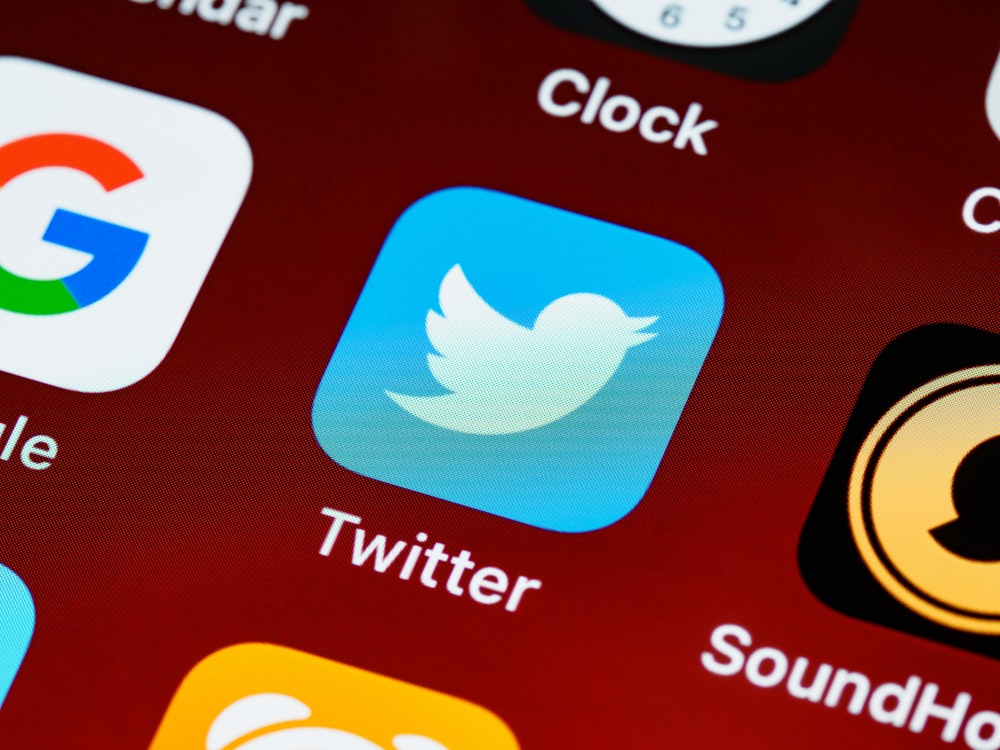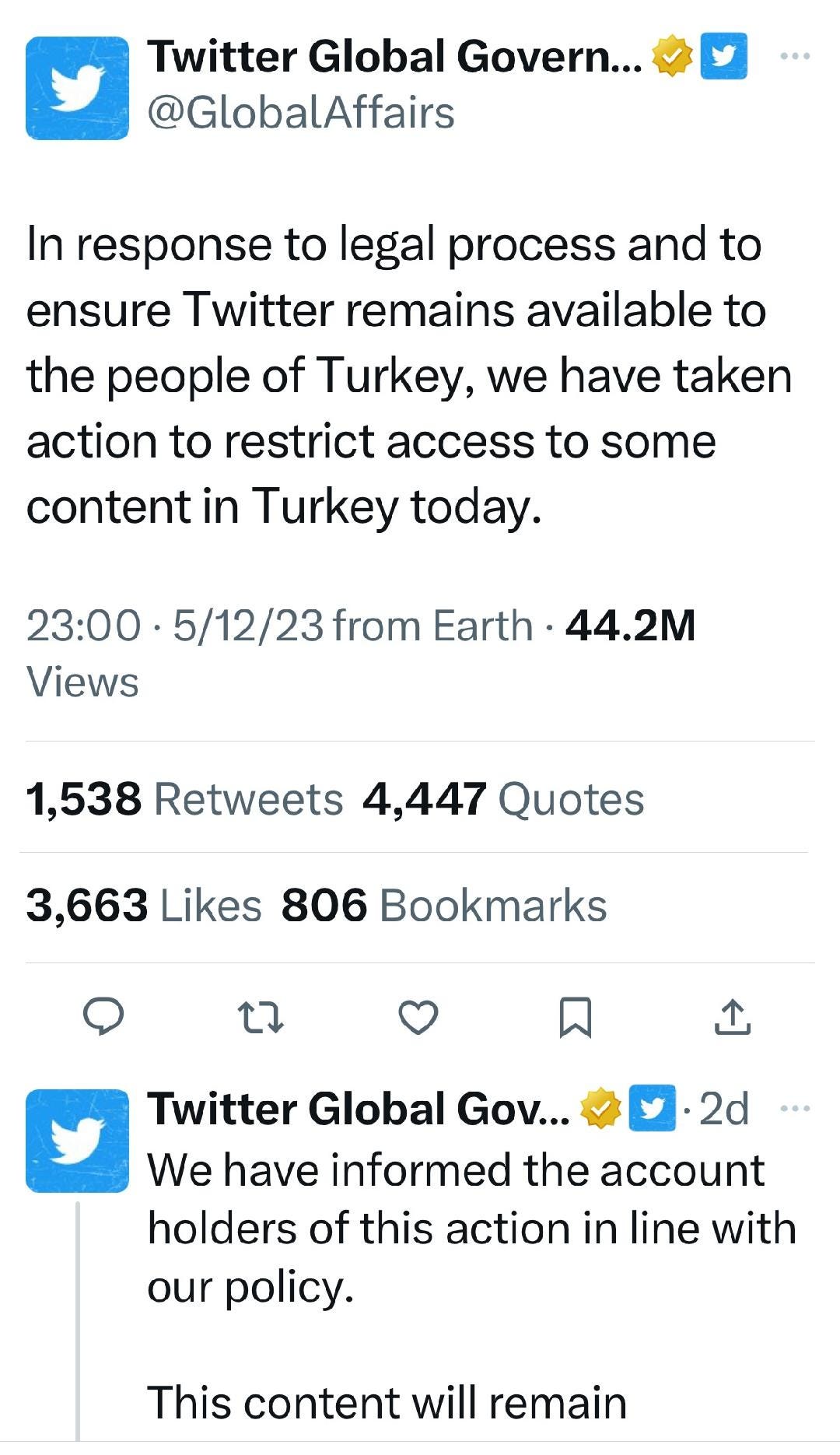WhWhen Elon Musk bought Twitter, his commitment to free speech was a big part of the purchase. Musk alleged that the government had conspired with Twitter’s old management to quash dissenting speech and even had Matt Taibbi release carefully selected internal documents from prior to his takeover of the company in a series of “Twitter Files” threads.
I read several of the Twitter files threads and never thought the actual releases measured up to the hype. There were quite a few problems with the documents that didn’t fit the narrative. Among these were the facts that most of the government interactions with Twitter seem to have been during the Trump Administration and many of Twitter’s crackdowns were on leftist accounts. Both undercut the narrative that the company collaborated with liberals in government to silence conservatives online.

At any rate, the news recently broke that the Turkish government had “requested” that Twitter censor opposition accounts ahead of the national elections in that country over the weekend. Despite Musk’s professed commitment to free speech online, the company acceded to the demand.
Two days before the election, Twitter posted this message confirming that it was engaging in political censorship.
Matt Yglesias took offense to this and retweeted the post with the message, “The Turkish government asked Twitter to censor its opponents right before an election and @elonmusk complied — should generate some interesting Twitter Files reporting.”
Yglesias added, “As I’ve been saying all along, the big problem with Twitter and free speech is that Musk has a much more significant business as the main shareholder of a major international car company that needs to curry favor with various regimes.”
And, as it turns out, Musk does do business with the Turkish government. SpaceX, another of Musk’s companies, contracted with the Turkish government for satellite launches in 2021. Tesla also expanded into Turkey in late 2022.
This drew the attention of Twitter’s troll-in-chief, who responded, “ Did your brain fall out of your head, Yglesias? The choice is have Twitter throttled in its entirety or limit access to some tweets. Which one do you want?”
Methinks he doth protest too much.
Aside from the snarky and unprofessional tone of Musk’s response, the tweet shows where Musk’s priorities lie. The moment could have been a touchstone in online free speech if Musk had tweeted the correspondence from the Turkish government and announced that Twitter would not comply on ethical grounds.
If the Turkish government shut down access to Twitter in the country, it wouldn’t be the only country where Twitter is banned. Twitter is already officially unavailable in a number of countries including China and North Korea, but in practice, these bans can be circumvented with virtual private networks (VPNs).
A Turkish ban on Twitter would tell us a lot about the Turkish government, however. The government of Recep Tayyip Erdogan has become increasingly authoritarian, taking actions like expanding presidential authority, purging and imprisoning opponents, and, well, censoring opposition Twitter accounts. If the Erdogan government actually banned Twitter from Turkey, it would telegraph Erdogan’s dictatorial intent.
Jonah Goldberg said it best when he tweeted, “If Twitter were throttled in its entirety perhaps Turkish voters would better understand the authoritarian tendencies of their government and the costs it’s imposing on the nation as a whole. Throttling the opposition to that govt on election eve doesn’t seem optimal IMHO.”
Or to put it another way, as Nicholas Grossman of Arc Digital tweeted:
FBI: We have a warrant to investigate a Twitter user for sexual exploitation of children, the govt will reimburse any labor costs you incur, as per law.
Twitter Files: POLITICAL CENSORSHIP!
Erdogan: Help silence my political opponents before the election.
Twitter: Oh-kay!
Is Musk concerned about the loss of revenue if Twitter lost its Turkish business? That doesn’t seem likely after the businessman valued the company at $20 billion in March, less than half of what he paid for it last year. Musk hasn’t seemed concerned with the company’s bottom line elsewhere, and his Turkish business seems far smaller than what he has written off by alienating American users. However, the value of Twitter’s business combined with SpaceX and Tesla could be enough to influence Musk’s actions, especially combined with losses that he has already taken from the markdown of Twitter and other business problems.
Musk seems to finding out what thousands of activists have found out in past decades. The US isn’t perfect and it’s a lot easier to protest the speck in America’s eye than the two-by-four in the eye of an authoritarian country.
Twitter belongs to Elon Musk. He and the board can run it as they see fit, even if that means running it into the ground. But it’s hypocritical to publish the Twitter Files decrying censorship and then partner with Erdogan to censor the platform in Turkey.
As a Muskian version of Teen Talk Barbie might say, “Moral consistency is tough!”
As I write this, election results are still being tallied in Turkey. CNN reports a likely runoff with Erdogan leading the main opposition candidate by a margin of 49.34 percent to 44.99.
Maybe the opposition will unite and Turks will vote to oust Erdogan, a man who has been in power since 2003. And maybe if they do, Erdogan will respect the will of the voters and step down.
If any of this happens, it will be no thanks to Elon Musk.

No comments:
Post a Comment